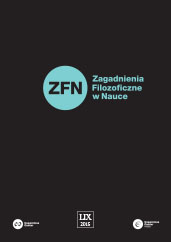Pozytywizm, racjonalizm i ... romantyzm Marii Skłodowskiej-Curie
Marie Skłodowska-Curie and Her Positivism, Rationalism and... Romanticism
Author(s): Barbara PetelenzSubject(s): Philosophy of Science
Published by: Copernicus Center Press
Keywords: Marie Skłodowska-Curie; Nobel Prizes in Physics and Chemistry; Positivism; Rationalism; Idealism; Romanticism;
Summary/Abstract: The International Year of Chemistry (2011), intertwined with commemoration of the Nobel Prize in Chemistry awarded in 1911 to Marie Skłodowska-Curie, made me to ask about the philosophical background of this outstanding woman. The first factor which I could see was the positivism, launched by August Comte in France and developed a few decades later by his Polish followers. Another factor which seemed to me important was the interplay between the emotional (romantic) and intellectual (positivistic) attitudes among the Poles in the 19th century. In her research, Marie Skłodowska-Curie used the positivistic, rationalistic method. This has led her (jointly with her husband Pierre Curie) to elucidation of the radiation phenomena discovered by Henri Becquerel in 1896. The research initiated by the Curies (rewarded by the half of the Nobel Prize in Physics 1903) caused a subversion of the 19th century’s views on the structure of Matter. The way to such spectacular results must have been paved not only by the positivistic intellectual discipline but also by a dose of romantic enchantment. In the applicative terms, Marie Skłodowska-Curie became a pioneer of the evidence-based medicine. In moral terms, she represented a rare example of the practical altruism, inspired indirectly by Christianity, and directly by the Comte’s “religion of Humanity”.
Journal: Zagadnienia Filozoficzne w Nauce
- Issue Year: 2015
- Issue No: 59
- Page Range: 101-124
- Page Count: 24
- Language: Polish

